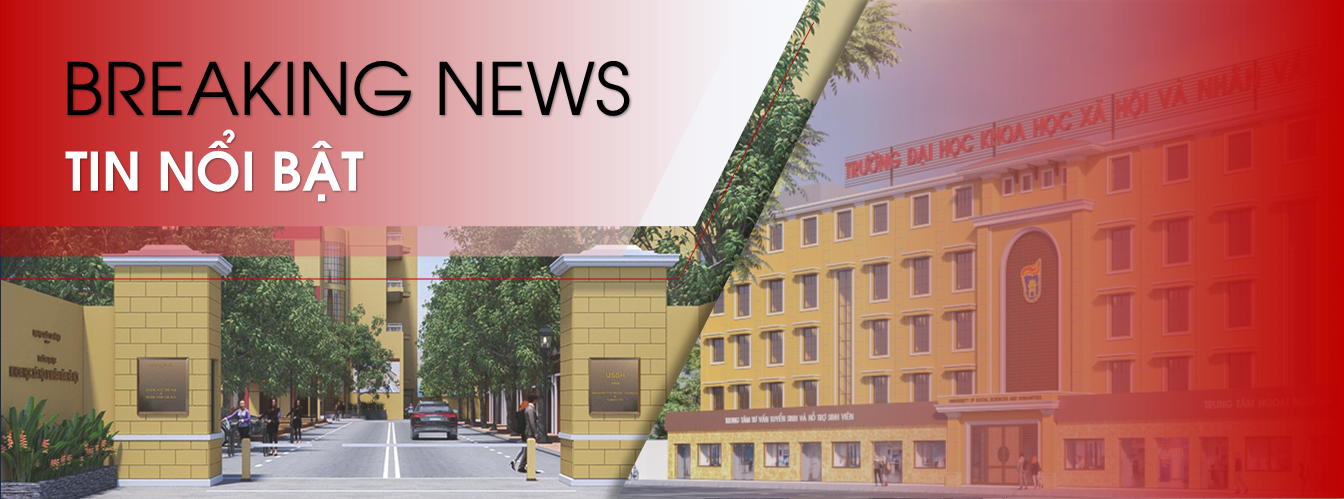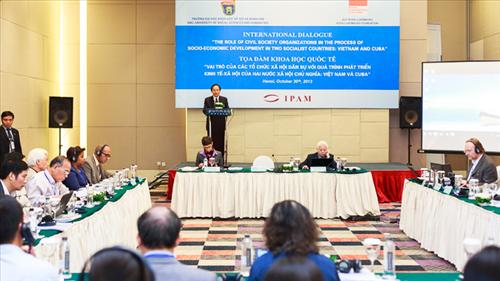Attending the seminar were Mr. Herminio Lopez Diaz (Ambassador of the Republic of Cuba to Vietnam), Ms. Nadja Charaby - Director of the Rosa Luxemburg Institute in Southeast Asia. The delegates attending the seminar were experts from the Federal Republic of Germany, Cuba, Mexico and the United States, managers, policy makers in the National Assembly, research experts from universities, institutes, research centers, representatives of civil society organizations in Vietnam.
In his opening speech at the workshop, Prof. Dr. Nguyen Van Khanh (Rector of the University of Social Sciences and Humanities) expressed his deep gratitude to the Rosa Luxemburg Foundation (Federal Republic of Germany) for its effective support to the University over the past 10 years. With the support of the Foundation, the University has successfully implemented research projects on policy making, the project on “Left-wing theoretical choices in a changing world” (from 2009-2011), and the project “Left-wing theoretical choices – an international comparison from the experiences of socialist countries” (2012-2013).
After nearly 5 years of operation, the project has achieved many results: implementing 08 international seminars and conferences organized around the issues of developing Left-wing theory in Vietnam and around the world, publishing more than 05 monographs on Left-wing theory, which gathers many research results, valuable reports on Left-wing theory and the development of this theoretical system in Vietnam and some countries around the world.
This scientific seminar continues to be one of the important activities of the project. The contents discussed in this seminar will contribute to further understanding of the contributions and roles of civil society organizations in the socio-economic development process in Vietnam and Cuba, thereby providing comparisons and recommendations to contribute to the development orientation of these organizations in the future for the two countries of Vietnam and Cuba.
At the opening session, delegates listened to the introductory report of Associate Professor, Dr. Dang Ngoc Dinh (Center for Community Support Development Research - VUSTA) with the topic: "How to effectively cooperate between civil society and the State: the case of Vietnam".
The paper goes from the basic concept of civil society to reflections on the operation, level of development and contributions of civil society organizations in Vietnam. The author believes that civil society in Vietnam is currently facing many difficulties in performing its role of monitoring, social criticism and anti-corruption. Mass organizations, especially at the central level, are still closely linked to the State and are not independent, especially in cases where it is necessary to reflect the aspirations of the people. The limitations of civil society in Vietnam are primarily related to the legal framework. The legal and policy framework has not yet been able to maximize the effectiveness of civil society in contributing to the process, from deploying social services, implementing policies, to providing comments and criticism.
The paper affirmed: There should be a mechanism to promote and facilitate civil society to contribute more actively to the country's economic and social development. It is necessary to build institutions so that civil society has a clearer voice in all aspects of life, not only in the field of service provision, but also in the field of capacity building and advocacy activities at all levels, in order to contribute significantly to economic and social development in an equitable manner. Moreover, civil society has a potentially very important role for society in promoting transparency and controlling corruption.
After the opening session, delegates discussed many specific contents: Political and social organizations participating in the policy-making process; Vietnam and Cuba - Economic and political changes since the Cold War; Position - role and responsibility of civil society in the current national development process; Social security role of civil society organizations; Role of associations in protecting geographical indications - experience from geographical indications and the Cuban Cigar brand; Civil society - an issue arising from Vietnam's renovation; Civil society in Cuba; Learning about the Cuban judicial system and some comparative connections with the judicial systems of the United States and Canada; The role of non-governmental organizations in preventing domestic violence; The reality of policy advocacy in Vietnam and the position of civil society organizations...






